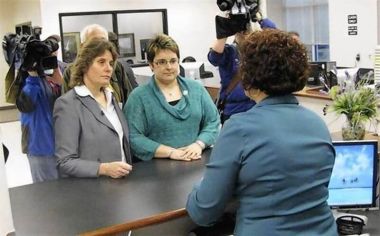More than 30 North Carolina magistrates refuse to officiate marriages—but it's legal

More than 30 magistrates in North Carolina are refusing to perform all kinds of marriages, particularly gay unions, based on their religious beliefs. The 30 magistrates reportedly represent 5 percent of the state's 670 magistrates.
However, unlike Rowan county, Kentucky clerk Kim Davis—whose refusal to issue same-sex marriage licences has landed her in jail—the North Carolina magistrates are able to assert their religious beliefs without fear of getting cited for contempt.
This is because of a new state law allowing officials to opt out of officiating in all marriages based on "sincerely held religious objection."
The law's original sponsor, Senate President Pro Tem Phil Berger, said the legislation prevents situations like the one in Kentucky.
"It's keeping folks from having to choose between their job and their religious beliefs. I think that's important," he said.
State law exempts court officials with a "sincerely held religious objection" from officiating in same-sex marriages. The law was passed for those who are against gay marriage after the US Supreme Court legalised it in June. Only Utah has a similar law.
It also applies to some register of deeds workers. In case all magistrates refuse to perform marriage, elected officials would do it as a last resort.
The North Carolina law took effect on June 11 when a veto of Republican Gov. Pat MCrory was overriden by the General Assembly.
After he was overriden, McCrory said, "It's a disappointing day for the rule of law and the process of passing legislation in North Carolina. I will continue to stand up for conservative principles that respect and obey the oath of office for public officials across our state and nation."
The law exempts magistrates and assistant and deputy register of deeds workers from performing all marriage ceremonies — gay and heterosexual couples — for at least six months when they send notices about their religious objection. Register of deeds issues marriage licences while magistrates officiate marriages.
The chief District Court judge or the county register of deeds — both elected officials — would perform the marriage transactions if no one else was available.
If all magistrates in the state recused themselves, magistrates outside the state who are willing to marry gay couples would be brought in.
According to the North Carolina Association of Registers of Deeds, about a dozen recused shortly after the law took effect.











